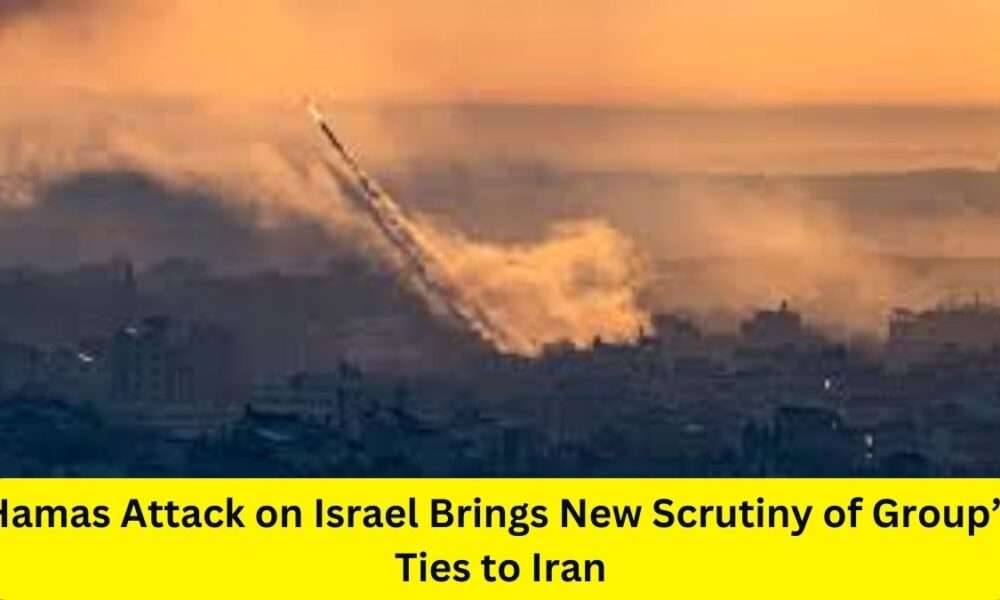Geopolitical tension has been high in the Middle East recently, and the Hamas attack on Israel has highlighted the complicated connection between Iran and Hamas once again. This essay explores the past of Hamas, its connections to Iran, the most recent attacks on Israel, and the ensuing international criticism. We’ll also talk about how this partnership affects the Middle East as a whole.
Historical Background of Hamas
The Islamic Resistance Movement, founded in 1987 by the Palestinian chapter of the Muslim Brotherhood, gained prominence for its violent actions against Israel during the First Intifada, a Palestinian uprising against Israeli rule.
Hamas-Iran Relationship
Iran and Hamas have a long history together, having first been connected when Hamas officials, short on funds and weapons in the early 1990s, looked to Iran for support. Iran, which has a sizable Shia Muslim population, supported the Sunni Hamas to oppose Israel and for ideological reasons.
Recent Hamas Attack on Israel
In recent years, Hamas has launched several missile attacks and incursions into Israeli territory against Israel. These actions have increased tension between the two sides and drawn attention from across the world.
Examining and Global Concerns
The world community is paying more and more attention to the Hamas-Iran collaboration. The stability of the area and its potential effects on international security are among the worries. The international world is very interested in learning how much Iran has control over Hamas’s actions and how this may affect regional stability.
The Middle East’s Position of Iran
Iran is an important player in the Middle East and a major regional influence. Israeli backing for groups like Hamas is part of their wider strategy to exert influence in the region, particularly in Iraq, Syria, and Lebanon.
Geographical Consequences
The Hamas-Iran alliance has complex geographical consequences. It impacts Israel’s security, regional alliances, and the broader Middle Eastern dynamics. It also has ripple effects on global politics, especially concerning the involvement of other major powers like the United States.
Response from Israel and the International Community
In response to Hamas strikes, Israel has launched military operations meant to impair the organization’s capabilities. The world community has demanded moderation and a diplomatic settlement of the dispute, led by the UN.
United States’ Perspective
The US has voiced worries about Iran’s participation in the area and has continuously backed Israel. In addition to placing sanctions on Iran, the US administration has kept a careful eye on its actions throughout the Middle East.
The Ongoing Conflict
The Hamas Attack on Israel remains unresolved, with ceasefires often fragile and temporary. The situation is characterized by cycles of violence and attempts at negotiation.
Future of Hamas-Iran Relations
The connection between Iran and Hamas is questionable going forward. It will rely on a number of things, such as how the world reacts, what Israel does, and how the Middle East’s dynamics change.
Regional Dynamics
The Hamas-Iran alliance is interconnected with the broader regional dynamics, including the Syrian conflict and the role of other regional powers like Saudi Arabia and Turkey.
The Humanitarian Aspect
Devastating humanitarian effects have resulted from the fighting, especially for Gaza’s civilian population, which is frequently caught in the crossfire.
The Broader Implications
Beyond the current crisis, there are implications to the connection between Iran and Hamas. They have an impact on Middle East stability, international security, and diplomacy.
Conclusion
Lastly, the attack by Hamas on Israel has shown the intricate relationship between Iran and the Palestinian group. The already unstable Middle East area becomes even more complex as a result of this dynamic. The whole community is still keeping a careful eye on things in the hopes that this protracted dispute will be resolved peacefully.
FAQs
Why does Iran support Hamas?
Iran backs Hamas for geopolitical and ideological grounds in an effort to balance Israel’s sway over the area.
What position does the US take on the dispute between Israel and Hamas?
In addition to continuously endorsing Israel, the US voiced worries over Iran’s influence in the area.
What impact have the latest Hamas attacks had on Gaza’s humanitarian situation?
The civilian population in Gaza has suffered greatly as a result of recent strikes, creating serious humanitarian issues.
What wider ramifications does the collaboration between Iran and Hamas have?
The alliance has an impact on international security, diplomacy, and Middle East stability.
What role does Iran play in ties with Hamas?
The future of their relationship is uncertain, influenced by various factors, including international responses and regional dynamics.
Read More: Techburneh.com










